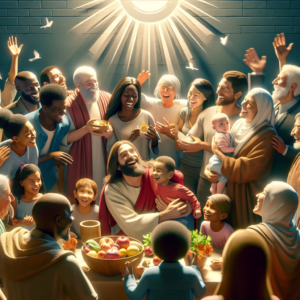Unlocking Timeless Lessons in “The Mill on the Floss” and Scripture
Have you ever found yourself lost in the pages of “The Mill on the Floss” by George Eliot, drawn into the complex world of Maggie Tulliver and her struggle between personal desire and familial duty? This classic novel, while a masterpiece of literary fiction, also serves as a mirror reflecting biblical principles of grace, forgiveness, and the consequences of our choices. Join us as we highlight the transformative nature of these themes and explore how they resonate with the teachings of the Bible, offering insights and encouragement for our daily lives.
Facing Consequences and Embracing Forgiveness
At the heart of Eliot’s novel is the theme of actions and their consequences, a principle deeply embedded in biblical doctrine. Romans 6:23 tells us, “For the wages of sin is death, but the free gift of God is eternal life in Christ Jesus our Lord.” Like Maggie, we are often confronted with the outcomes of our decisions that can sometimes lead to unforeseen hardships and trials.
However, the Bible doesn’t leave us in despair. 1 John 1:9 provides a beacon of hope, stating, “If we confess our sins, He is faithful and just to forgive us our sins and to cleanse us from all unrighteousness.” Eliot masterfully illustrates the transformative power of forgiveness and redemption, reminding us that, although we may stumble, there is always a path towards forgiveness and a renewed life.
The Struggle Between Desire and Duty
Maggie Tulliver’s narrative is a poignant exploration of the conflict between one’s own desires and familial duty, a theme that echoes the biblical principle of self-sacrifice for the good of others. Philippians 2:4 encourages us, “Let each of you look not only to his own interests, but also to the interests of others,” a principle that Maggie grapples with throughout the novel.
This struggle is emblematic of the Christian journey, as believers are called to navigate the tension between personal desires and the call to live a life that reflects the love and sacrifice of Jesus. Eliot’s portrayal of Maggie’s journey encourages readers to consider their own paths and the choices they make in light of their impacts on those around them.
Finding Redemption and the Path Forward
The narrative of “The Mill on the Floss” ultimately leads us toward the theme of redemption and reconciliation, mirroring the redemptive power of Christ’s love. Colossians 1:13-14 offers a powerful reminder: “He has delivered us from the domain of darkness and transferred us to the kingdom of his beloved Son, in whom we have redemption, the forgiveness of sins.”
Through Maggie’s journey and her ultimate sacrifices, Eliot illustrates that, despite the trials and tribulations we face, there is always hope for redemption and a brighter future. This powerful message encourages readers to seek forgiveness, pursue reconciliation, and embrace the transformative power of God’s love in their lives.
Embracing Life’s Lessons with Grace
As we reflect on the themes of “The Mill on the Floss” and their alignment with biblical principles, we’re reminded of the enduring power of grace, forgiveness, and redemption. These are not just themes for literary analysis but guiding lights for our journey through life. They encourage us to face our challenges with courage, to seek and extend forgiveness, and to live with the hopeful assurance of redemption.
In conclusion, let us take to heart the lessons of Maggie Tulliver’s story and the timeless truths of Scripture. May we navigate the ebb and flow of life’s rivers with faith, hope, and love, always mindful of the grace that guides us home.
Are you inspired to delve deeper into how biblical principles can transform your life? Take a moment to reflect on the areas where you seek forgiveness and redemption, and reach out to a community that supports your spiritual journey. Together, we can discover the power of God’s love and grace afresh.
If you want to learn how ANY book relates to Biblical principles, please try our Books and Scripture GPT. Simply type in the name of a book and let it show you insights you might not have been aware of!


